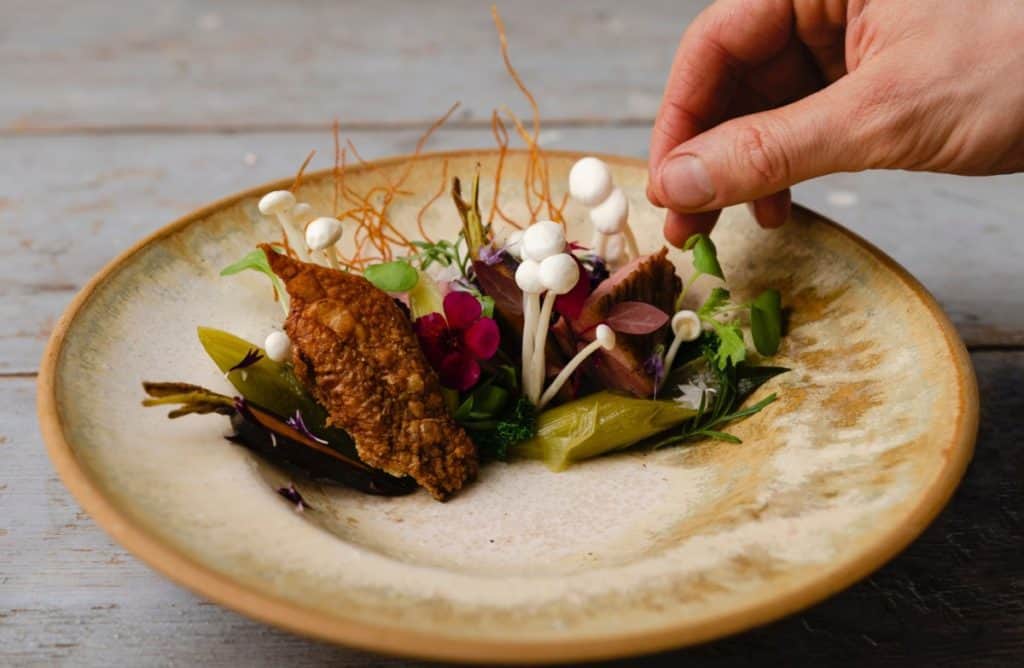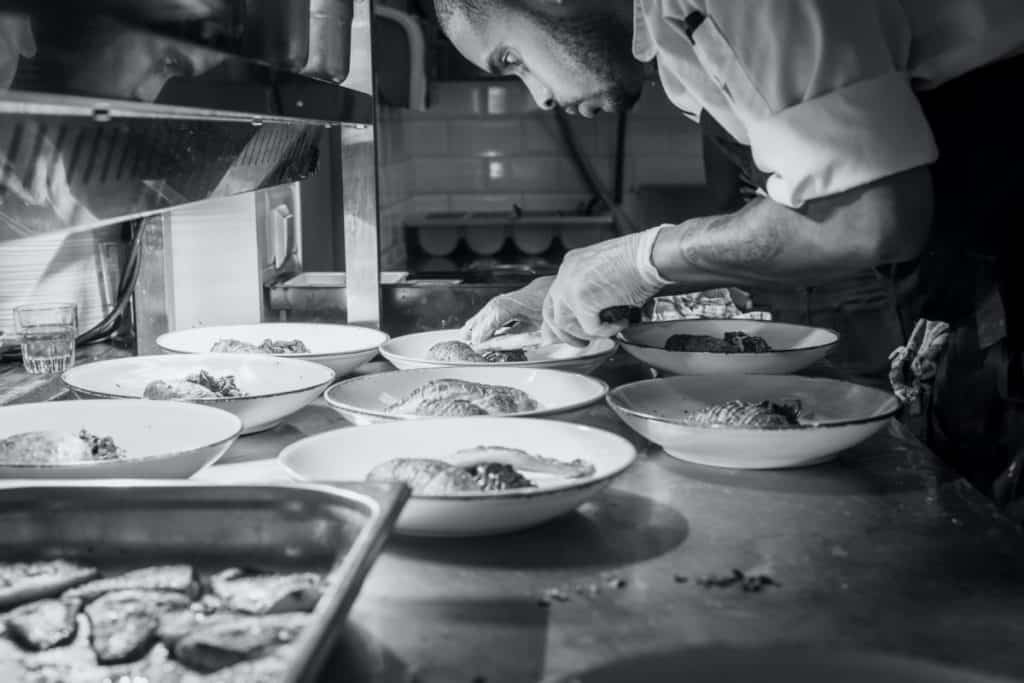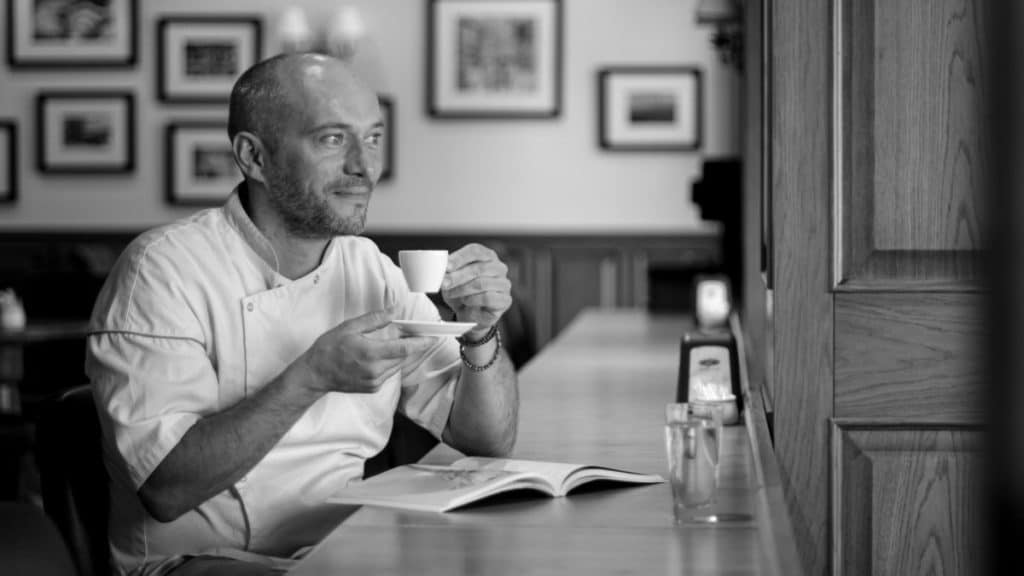
A Head Chef is the person we think of when picturing someone at the front of the kitchen; giving out the orders and leading the team like a conductor in an orchestra.
But is the Head chef really the one in charge? Is it they who are the ultimate boss of the kitchen; a ruler who’s word is final, and a put up with it or get out mentality exists?
That will be the focus of this article. We shall look at what a Head chef does, and who a Head chef reports to.
The Head Chef is responsible for running the kitchen on a daily basis. They take charge of the cuisine being produced as well as having responsibility for the business side of catering, such as making a profit. The Head chef reports to the Executive Chef and/or the restaurant owners.
That’s the answer in a nutshell, but as we can imagine, things are not always as straightforward as this. We’ll start by looking at the role of the Head chef.
What Does A Head Chef Do?
The role of a Head chef is similar to that of a hands on manager in other areas of business. They are expected to come up with ideas for strengthening the business, and then ensure they are being implemented.
The Head chef is responsible for the direction that the cuisine should be moving in. A restaurant will select their Head chef based on their ideas and vision.
A great Head chef has a set idea of how they want the cuisine to be, are able to formulate a plan to realise that vision, and have the necessary skills (including people managing abilities) to make that vision a reality.
(including people managing abilities) to make that vision a reality.
Head chefs have control over the direction of the cuisine in several ways.
- In joint discussions with the owners they will decide on the type of cuisine best suited to the customer base and everyone’s hopes for the future direction.

It is a bad situation if the owners want traditional French cuisine and the Head chef has their sights set on an Asian inspired restaurant. In these situations the Head chef and the owners will part company.
When owners select a head chef they will ensure that their visions for the restaurant match. It saves a lot of heartache and failure in the long run.
match. It saves a lot of heartache and failure in the long run.
- The head chef will put together ideas and write the menus.
Menu writing is a crucial part of being a Head chef. If the menu and the ideas are poor then no matter how well run the kitchen is, the customers will not be inclined to come and dine.
A chef relies on all their previous experience and knowledge to show off their own individual talent. This is why kitchen experience is talked about in such high regard, it is experience which allows you to create great menus.
is talked about in such high regard, it is experience which allows you to create great menus.
- The next stage is sourcing suppliers for all the menu ingredients. This is often not as straightforward as it sounds. A head chef needs to communicate with a vast range of suppliers in order to source all the ingredients.
Anyone who has read a recipe online then trundled of to the shops to get the ingredients, knows how frustrating it can be actually trying to source what we need! More often than not, suitable substitutions are needed.
This is especially true in modern cooking with the amount of unique ingredients needed to create the various foams etc. This can be challenging, and long lead times on specialist ingredients are the norm.
with the amount of unique ingredients needed to create the various foams etc. This can be challenging, and long lead times on specialist ingredients are the norm.
- Implementation of the menu comes next. This is what many of us picture when we think of a head chef in the kitchen. It is their role to manage the brigade
 so that their vision and standards are being met.
so that their vision and standards are being met.
During the day whilst prepping , a head chef will take the time to explain to their chefs how they would like elements of the dish created.
, a head chef will take the time to explain to their chefs how they would like elements of the dish created.
This knowledge is filtered down through the ranks so all chefs know what is expected and how to recreate the dishes correctly.
so all chefs know what is expected and how to recreate the dishes correctly.
- During service the Head chef will then conduct the kitchen so that everyone is working together. This is why the head chef stands at the front; they have the ultimate say on the dishes that leave the kitchen.
It is the head chef’s passion (and their job on the line ultimately) if the dishes leaving the kitchen are not what was envisioned and hoped for.
Alongside all this cuisine work a Head chef is also expected to manage the financial side of the kitchen. They must ensure when they write a menu and price it, that the restaurant can make a profit!
No matter how good the cuisine leaving the kitchen; if the restaurant isn’t making money there is a limited time this can be sustained.
This may sound obvious but many chefs fall into the trap of putting their ideas and vision before the underlying profit. The best chefs  are able to do both.
are able to do both.
- The general management of the kitchen staff is also handled by the head chef. They are not the first port of call for many but there are some issues only they can solve.
Similar to a manager in any organisation, there are layers of supervisors before a conversation with the head chef is required. In fact for many commis chefs , a chat with the head chef about wages
, a chat with the head chef about wages , or booking holiday time off, is the last thing they want to do!
, or booking holiday time off, is the last thing they want to do!
With all this work to do readers may be wondering if head chefs actually get to cook.

Do Head Chefs Actually Cook?
A Head Chef can often be found actually cooking in the kitchen. As a general rule, the smaller the number of people working in a kitchen brigade, the more likely the head chef is to be cooking during service time.
For example, in a kitchen of 5 members the head chef will be prepping food and cooking during service alongside everyone else. In a kitchen of 30 members, the head chef will not cook during service but will be on the pass checking for quality and plating up.
In my experience the amount of cooking a head chef does often depends on the chefs personality
. Some chefs love to be in the kitchen prepping and cooking alongside the other chefs, where as the office chair has more of a pull to others!
So that’s the role of a head chef in a nutshell. Now let’s look at who, if anyone, they have to report to.
Who Does A Head Chef Report To?
The Head chef reports to the Executive chef or to the owners of the restaurant. In some situations the Head chef will encompass all three of these roles, and will be in control of the business overall.
When The Head Chef Owns The Restaurant
Many times in catering we see a situation where a head chef gets to realise their long held dream and open their own restaurant.
Why this is a dream for many is that they are now answerable to no one (in theory). As the head chef and owner, they get to put what they want on the menu and take the business in their direction.
As anyone can imagine taking on all these different roles is challenging to say the least and perhaps one of the driving factors as to why so many restaurants fail early on.
to say the least and perhaps one of the driving factors as to why so many restaurants fail early on.
Successful head chefs in this position are often able to make it work because they are able to pull in a large support network of sous chefs and other positions. Often it is their work colleagues whom they trust and have collected over the years.
and other positions. Often it is their work colleagues whom they trust and have collected over the years.
If there is only one physical restaurant venue, an executive chef is usually not required. In a typical restaurant set up the owners will deal directly with the head chef (as we looked at earlier) and it is vital they have a good working relationship.
is usually not required. In a typical restaurant set up the owners will deal directly with the head chef (as we looked at earlier) and it is vital they have a good working relationship.
When The Head Chef Is Not The Owner
If someone else owns the restaurant, the head chef must report to them. In this regard they are an employee in the same way as anyone else. If the owner and the head chef find themselves not getting along so well, it is the chef who will be asked to leave.
In some dysfunctional cases this structure can become muddled. The Head chef starts to believe (rightly or wrongly) that the business would be nothing without them and starts behaving like the owner.
Owners (especially those with little cuisine knowledge) can find themselves in the position of feeling like they are beholden to the head chef’s whims. They begin acting like it is they who work for the head chef.

This situation never ends well; the head chef eventually leaves, the owners eventually fire them, or the business goes bust.
Whilst Head chefs must report to the owner there is a mutual respect between the two parties. In this way the Head chef is a valuable team member that the owners do not want to lose.
We often see when a head chef leaves a Michelin star awarded restaurant the standard of the cuisine drops over time leading to a loss of the star.
awarded restaurant the standard of the cuisine drops over time leading to a loss of the star.
If we have a situation where by an owner has several restaurants they will usually enlist an executive chef to oversee the multiple locations.
When There Is an Executive Chef
An Executive chef ensures consistency between the different restaurants. They achieve this by working closely with the head chef in each kitchen and it is the executive chef who the head chef must report to.
Gordon Ramsay is a great example of an Executive chef. He has multiple restaurants spanning many countries and clearly he cannot be in each one cooking at the same time!
is a great example of an Executive chef. He has multiple restaurants spanning many countries and clearly he cannot be in each one cooking at the same time!
Instead chef Ramsay places head chefs in each kitchen to ensure that his vision is being carried out at the local level. He may not often meet with these head chefs but when he does we can be sure they report to him!
Any head chef who is under performing will be disciplined, and ultimately fired, by the executive chef . This type of situation is very beneficial for avoiding the toxic situation looked at earlier where by the head chef starts believing they are above the owner.
. This type of situation is very beneficial for avoiding the toxic situation looked at earlier where by the head chef starts believing they are above the owner.
Head chefs are always respectful to the executive chef and vice versa. Executive chefs respect the work the head chefs do but make it very clear who is in charge.
It does not have to be a restaurant empire on the scale of Gordon Ramsay’s in order to have an executive chef. If a place has as little as two venues they will often benefit from introducing an executive chef to monitor consistency.
There is nothing preventing an owner referring to themselves as the executive chef, even if they only own one restaurant. However, unless they are a chef themselves with relevant experience, this is likely to be met with amusement by the other members of the kitchen team.
To Sum Up
I hope this article has demonstrated that although a head chef is top of the tree within the kitchen, they must still report to others above them.
Similar to any career path, the only time we are at the very top of the organisation, and reportable to no one, is if we own the business ourselves!
